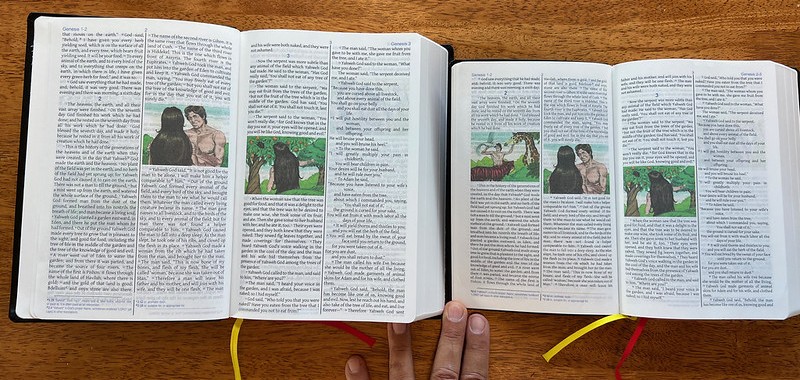
The World English Bible is a translation of the Holy Bible. Actually, it is more of a series. Please allow me to explain.
The original, classic World English Bible (WEB, or sometimes WEBUS) is an update of the American Standard Version of 1901, with updates in the New Testament to conform the translation to the Greek Majority Text in those places where it makes the most difference. It conforms to American English spelling and grammar. Where the ASV used “Jehovah” for God’s proper name in the Old Testament, the WEB uses “Yahweh”, which more accurately reflects the most likely pronunciation of the Hebrew יהוה. This is the only one that still uses “Yahweh”.
The World English Bible British/International Edition (WEBBE) is the same as the WEB, except for the use of British spelling (like “neighbour” instead of “neighbor”) and a subtle difference in spelled-out numbers. It also switches from using “Yahweh” to using “LORD” or “GOD” (all capital letters) like many other English Bible translations.
The World English Bible Updated (WEBu) is the same as the Classic WEB, except that it uses “LORD” or “GOD” (all capital letters) instead of “Yahweh” in the Old Testament. Also, it is the same as the WEBBE except that it uses American English spelling.
The World Messianic Bible (WMB) is like the WEBu, except that it substitutes more Hebrew forms of proper names, feasts, etc. It presents the books of the Old Covenant in the same order as the traditional Hebrew Bible. It is intended for use by Messianic Jews who speak American English.
The World Messianic Bible British Edition (WMBB) is the same as the WMB, except for the use of British/International English spelling. It is intended for use by Messianic Jews who speak British/International English.
The classic WEB, from which all of the other variants is derived, includes all 66 books of the Protestant canon of Scripture plus 15 books that are referred to as Deuterocanon or Apocrypha, depending on who you ask. The WMB and WMBB do not include these books, as those aren’t considered to be canonical Scripture by the Jews. We don’t try to solve the problem of disagreements about these books, but rather offer choices. Some people from some church traditions prefer to include these books. Some people from some church traditions will reject any Bible that includes these books. There are some positions in between, with different books in the set given different status by different groups. Our attempted solution to this problem is to offer the full ecumenical set of books in the main digital distribution of the WEB, WEBBE, and WEBu, and let people ignore the “extra” ones. In print, the extra cost of more pages becomes an issue, as well.
“Ecumenical Edition” means that all books are included.
“Old and New Testaments” means that just the 66 books of the Protestant Canon are included. We also have some digital editions like this. The WEBP is the same as the WEBu without the Deuterocanon/Apocrypha. WEBPB is the same as the WEBBE without the Deuterocanon/Apocrypha. The WEBC is the same as the WEBu, except that it presents only the books regarded as Canon and Deuterocanon by the Catholic Church, and in the traditional Catholic order.
Of course, in print, there are additional options of print size, paper thickness, red letters or not, illustrations or not, binding and cover type, etc.
There are lots of choices, but the World English Bible remains an excellent choice for a well-respected, accurate, modern English translation of the Holy Bible that you are free to print, publish, share, post, record, etc., with no copyright hassles.